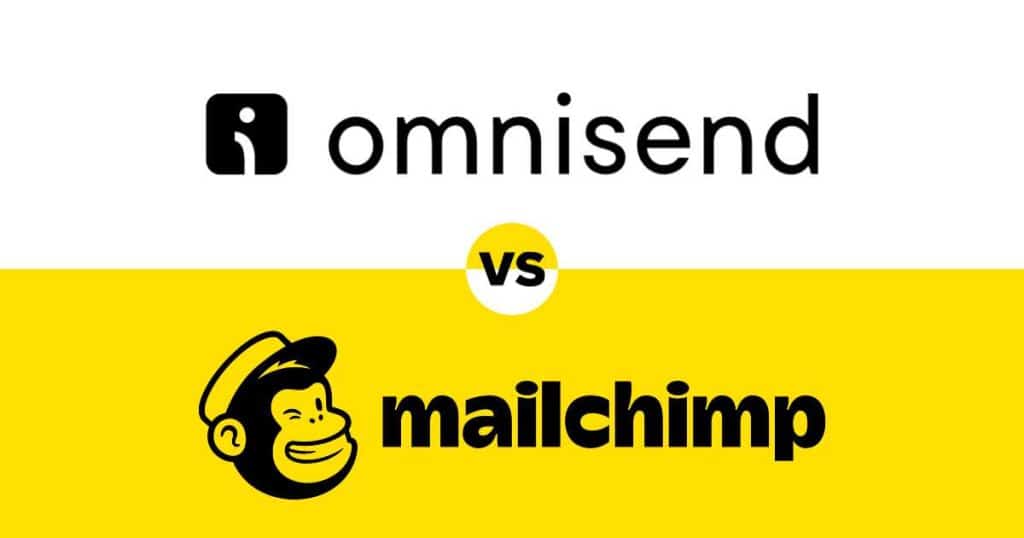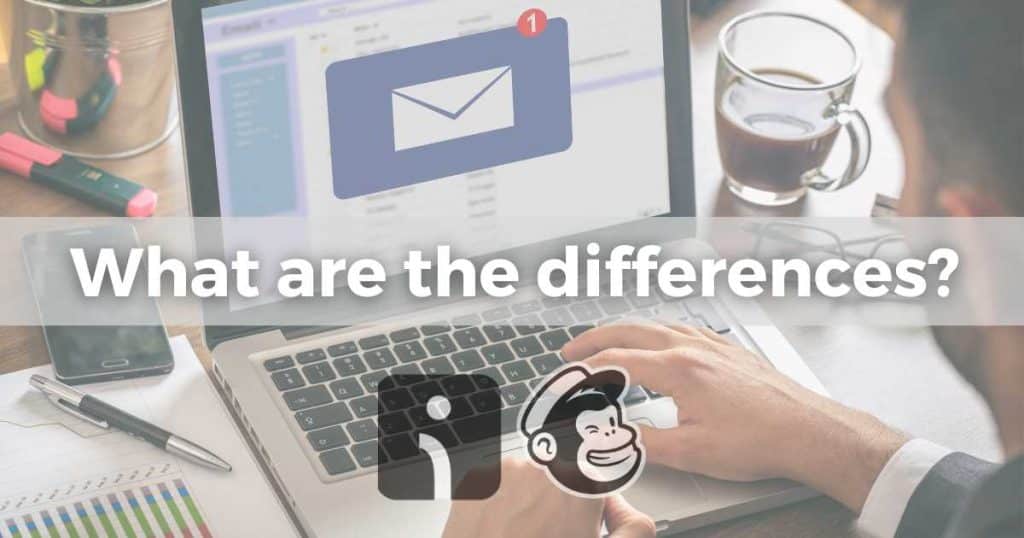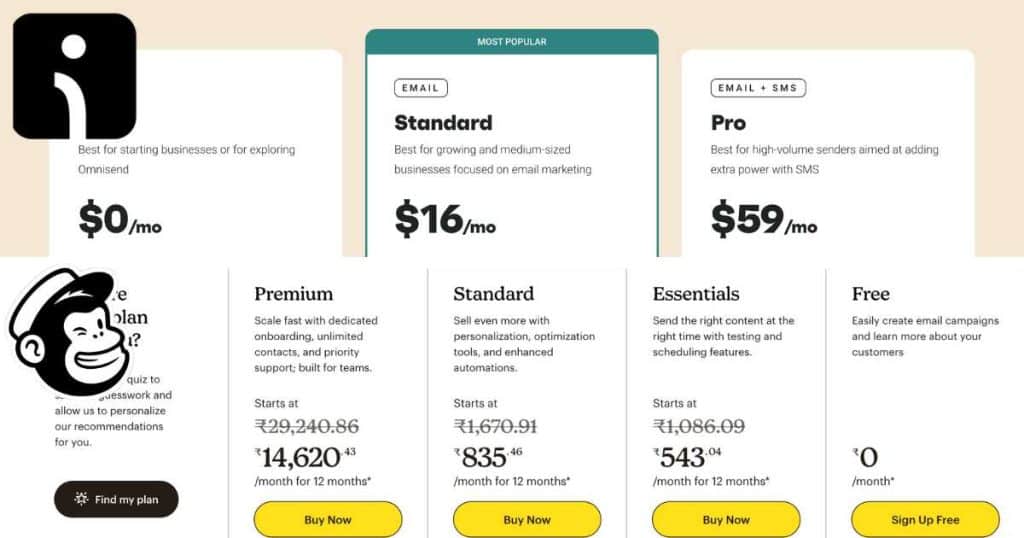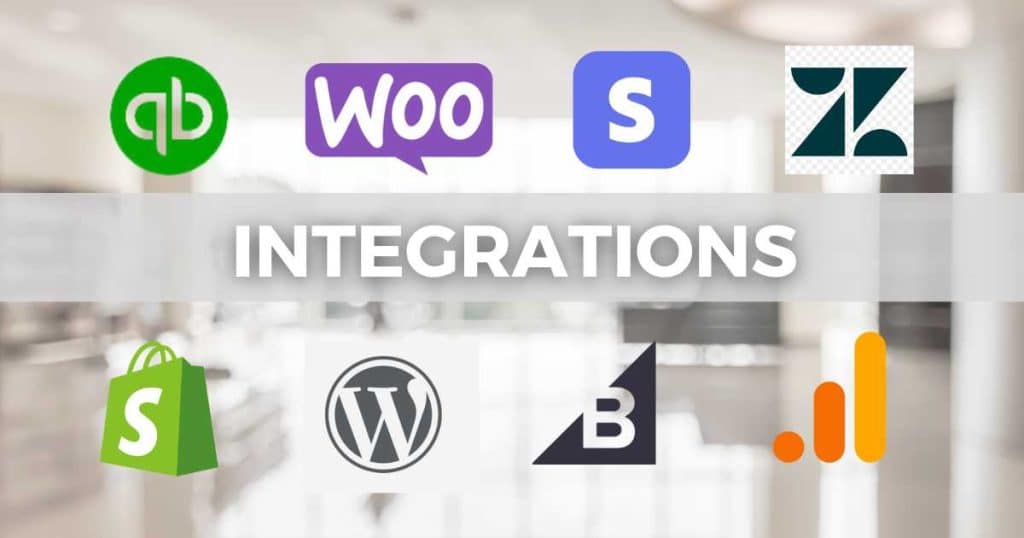Do you need help deciding between Omnisend vs MailChimp for email marketing?
Email marketing is still the best way to improve customer communication, increase brand promotion, and drive business growth in 2023. And it isn’t slowing down anytime soon!
And if you want to get serious about email marketing, you should consider these two top contenders – Omnisend and MailChimp.
Read more: Top 5 FREE Email Marketing Software For Small Business.
Omnisend vs MailChimp 2025

MailChimp has arguably been the most powerful email marketing solution for many businesses for years.
So, can Omnisend live up to MailChimp’s intuitive interface, competitive pricing, and dynamic tools? Or does MailChimp still come out on top?
In this Omnisend vs MailChimp ultimate showdown, I will compare both platforms side by side and feature by feature to find out which email marketing tool is best for you.
Are you ready to establish your brand and harness the power of email marketing today?
Read more: How To Use MailChimp
What are they? Omnisend vs Mailchimp
Omnisend is a popular sales-driven platform created in 2014 for eCommerce businesses after results.
But Omnisend is not just an email marketing platform! You’ll get powerful automation and segmentation capabilities for both email and SMS marketing!
Plus, with stunning templates, forms, popups (and more), Omnisend is the perfect choice for eCommerce stores wanting to drive more conversions easily.
On the other hand, MailChimp is a leading all-in-one email marketing and automation software designed in the early 2000s as an affordable alternative for small start-ups.
Since then, it has grown to over 13 million users worldwide, offering a comprehensive suite of features, including social media management, CRM tools and a website and landing page builder.
What Are The Differences Between Omnisend vs MailChimp?

While both tools are excellent in what they do, there are some big differences between Omnisend vs MailChimp.
For starters, MailChimp is more generic, catering to all types of businesses.
Whether you’re a local brand, not-for-profit organization, information-based, or eCommerce company, MailChimp can help you boost your business online!
In contrast, Omnisend was built purely for dedicated eCommerce businesses.
The next difference is the range of features each offers.
Omnisend stands out with its inclusion of SMS marketing capabilities. And despite offering a smaller feature set than MailChimp, Omnisend excels in doing those features incredibly well.
Although MailChimp doesn’t provide SMS marketing, its email marketing tools and supplementary marketing features are why teams love MailChimp as an all-in-one solution.
Read more: How to Create a Free eCommerce Store with Google Sites.
Omnisend vs MailChimp Ease Of Use
Is Omnisend easy to use? Or is MailChimp more user-friendly?
Setting up and connecting to your online store with Omnisend only takes a few minutes. The interface is simple, clean, and functional, with everything you need clearly labeled!
I personally think the interface is easy to use and not overly cluttered.
On the other hand, MailChimp is known for its ease of use and user-friendly interface, and it certainly lives up to its name!
Both platforms have easy-to-use editors with drag-and-drop functionality and are generally pretty easy to navigate, even for beginners.
Winner = Draw
Omnisend vs MailChimp Pricing

Omnisend has a simple 3 tiered pricing structure:
- Free: Reach up to 250 contacts (unlimited contact list size), 500 emails, and 60 SMS per month. Includes standard reports, unlimited segmentation, 500 web push notifications, and access to all automation and campaign features.
- Standard: $16 per month (up to 500 contacts). Up to 6000 emails and 60 SMS per month. Includes all features in the free plan plus unlimited web push notifications, optional Omnisend branding on forms, and customer support manager from $400.
- Pro: $59 per month (up to 500 contacts). Unlimited emails and 3993 SMS per month. Includes all features in the standard plan plus advanced reporting and 24/7 priority support.
Additionally, you can buy SMS credits no matter your plan.
MailChimp has 4 tiered dedicated Marketing pricing plans:
- Free: Up to 500 contacts and 1000 monthly emails. Includes basic email templates and marketing features.
- Essentials: From $13 per month. Includes 5000 emails per month, 3 audiences, and 3 seats.
- Standard Plan: From $20 per month. Includes 6000 emails per month, 6 audiences, and 3 seats.
- Premium: From $350 per month. Includes unlimited emails, unlimited users, and audiences.
MailChimp also offers separate Transactional Email and Website and Commerce plans.
Note: Most features on Omnisend are available on the free plan, whereas MailChimp’s free plan features are more limited.
Winner = Omnisend
Omnisend vs MailChimp Marketing Features and Tools
Omnisend’s free plan includes every feature Omnisend has to offer!
Undoubtedly, this is why so many business owners looking to scale and grow their brands love and use Omnisend.
Some marketing features include:
- Email templates
- A/B testing.
- Discount codes.
- Landing pages.
- Abandoned Cart.
- Product recommendations.
- Custom tags.
- Automation templates.
MailChimp also offers generous, jam-packed marketing features, including:
- A/B testing.
- Email scheduling.
- Abandoned cart.
- Automated customer journeys.
- Discount codes.
- Landing pages.
- Email templates.
- Appointment scheduling.
- Tags and custom fields.
- Mobile App.
- Behavioral tracking.
Note: Some of MailChimp’s features aren’t available on the free plan.
The verdict?
Omnisend’s full-featured free plan is ideal for small businesses with limited subscribers who want to target their audience across multiple channels.
On the other hand, Mailchimp has more features in general and slightly more affordable pricing for users with larger lists.
Winner = MailChimp
Read more: Klaviyo vs MailChimp
Omnisend vs MailChimp Standout Features / Tools
SMS Marketing

SMS marketing has the cutting edge over email marketing for a few reasons. Firstly, SMS messages have a high open-rate (and therefore a high probability of being seen by your audience).
Plus, SMS is widely used as a common communication method around the globe, meaning you’ll reach more people.
Ultimately, SMS marketing can effectively grab attention, engage customers, and prompt action.
Simply send pre-made abandoned cart, sales completion reminders, order and shipping confirmations, and birthday greeting text messages directly to your customers through SMS.
Omnisend’s SMS marketing and text campaigns seamlessly connect with your online store, email campaigns, and Omnisend’s robust automation features.
MailChimp doesn’t have built-in support for SMS campaigns, but it is possible! You’ll have to use the SimpleTexting integration to add SMS to your marketing strategies.
However, MailChimp provides options for postcards and digital ads with Facebook, Instagram, and Google Ads as alternative advertising methods.
Winner = Draw
Read more: How to Use Klaviyo Email Automations
Website Builder:

MailChimp’s website builder comes with SEO tools, a free SSL certificate, online store capabilities, and a free MailChimp domain name.
It’s pretty easy to use and totally free! The only downside is that there aren’t too many themes.
Omnisend doesn’t have a website builder, but you can easily connect it with popular online store platforms like Shopify, WooCommerce, or Wix.
Winner = MailChimp
Read more: How to Connect MailChimp to HubSpot.
Form Builders:

Both solutions have pretty dynamic form builders.
With Omnisend, you can create 4 types of forms:
- Popup.
- Signup Box.
- Wheel of Fortune.
- Landing Page.
And with MailChimp, there are 3 different form types:
- Popup.
- Embedded.
- Signup Landing Page.
In my opinion, MailChimp’s form builder is a little less intuitive than Omnisend’s.
Winner = Omnisend
Automation:

Omnisend vs MailChimp Automation (image)
Omnisend’s comprehensive automation capabilities and marketing automation builder are pretty impressive.
With a range of basic automation templates, including welcome emails, abandoned cart recovery, cross-cart, and browse abandonment, you can be sure to choose the right automation template!
The automation email builder is intuitive, with clear start and end conditions and customizable steps. All actions are easily accessible and can be dragged and dropped onto the automation timeline.
But the power of Omnisend’s automation lies in its ability to seamlessly integrate all aspects of the platform, such as email, SMS, and push notifications.
The only negative is that historical data is only kept for up to 18 months with Omnisend (and that’s only for Pro plan members!).
In comparison, while Mailchimp’s pre-made automations are good, they’re more rigid than Omnisend, limiting options to email marketing or ad campaigns.
Plus, you’ll need a paid MailChimp plan to access multiple automation workflows.
So, when it comes to marketing automation alone, Omnisend is the superior choice!
Winner = Omnisend
Read more: How to Connect MailChimp to WordPress.
Segmentation:

Overall, Omnisend and Mailchimp have pretty extensive segmentation options, but some distinct differences exist.
Omnisend offers extensive contact segmentation on all plans. That’s right – even the free plan!
Segment your contact list by shopping behavior, contact properties, web browsing activity, demographics, and more so that your emails reach the right people.
Mailchimp also offers powerful segmentation capabilities, including demographics, location, and email engagement. Plus, it can predict the customer’s CLV based on past purchase behavior!
And their dynamic content block feature can show different sections of an email to various audiences, allowing for a highly customized campaign.
Mailchimp only offers advanced segmentation for its higher-tier plans, while Omnisend provides it on all plans.
In saying this, small teams and businesses that opt for a free email software plan typically only require simple segmentation.
In this case, Omnisend’s comprehensive approach may be overkill. And therefore, I believe MailChimp’s free segmentation capabilities are sufficient for small businesses and free plan users.
Winner = Draw
Integrations:

Omnisend provides seamless integrations with major eCommerce platforms like Shopify, WooCommerce, and BigCommerce, as well as more than 130 other tools, such as Zapier, Google Ads, and loyalty and rewards apps.
Mailchimp, however, wins by a landslide, with over 300 integrations available with some of your favorite tools like QuickBooks, Shopify, Stripe, Zendesk, WordPress, and more.
These integrations cover anything from CRM, eCommerce, customer support, payments, accounting, and socials.
Plus, they have a direct integration with Google Analytics for enhanced reporting!
While Omnisend has a solid offering, it could learn a thing or two from MailChimp when it comes to integrations to enhance the platform’s functionality.
Winner = MailChimp
Read more: WooCommerce vs Shopify
Omnisend vs MailChimp Support
Omnisend goes above and beyond to provide exceptional 24/7 live chat and email support.
And one of the things I love is that during peak times like Black Friday, they ensure even more support is available to handle the increased demand!
Their commitment to customer satisfaction is evident in their lightning-fast chat response times, averaging under 5 minutes.
In addition to their exceptional support, Omnisend offers a valuable knowledge base filled with informative articles and guides.
But it doesn’t stop there! Omnisend also provides a regularly updated blog filled with valuable and actionable marketing tips, all for free.
When it comes to customer service, Mailchimp doesn’t disappoint either, with 24/7 chat, email, or phone support on all plans.
And similar to Omnisend, Mailchimp also offers a comprehensive knowledge base and blog.
Winner = Draw
Omnisend vs MailChimp : Who Are They Best For?

Don’t get me wrong, Omnisend and MailChimp are excellent email marketing platforms! But they are very different tools, catering to very different businesses.
The bottom line?
Omnisend is your go-to choice to take your eCommerce marketing to the next level.
Due to the easy-to-use form builder, convenient SMS marketing feature, and game-changing automation tools, even beginners can create personalized email campaigns effortlessly!
On the other hand, MailChimp is a more generic and feature-rich platform.
Therefore, if you’re not in eCommerce or if you’re simply looking for an all-in-one email marketing solution, MailChimp is the obvious choice for you. It’s the perfect fit for businesses of all sizes and industries, offering versatility and endless possibilities.
Stew’s Final Thoughts
For years, MailChimp has been my number-one pick. In fact, I use MailChimp for my business and email list.
However, I’ve known about Omnisend for a while. And after researching and testing it out for myself, I realized how valuable it is in the eCommerce world, rivaling other email and SMS platforms like Klaviyo.
Whatever you pick, both have what it takes to drive your marketing success.
So, why don’t you try them out today? Leave a comment below to let me know how you get on.
It’s time to watch your email campaigns soar!

